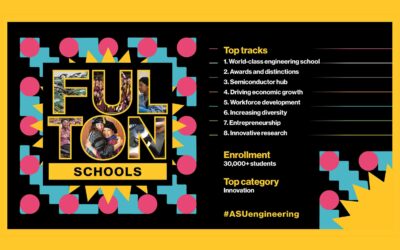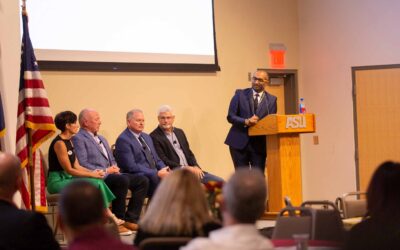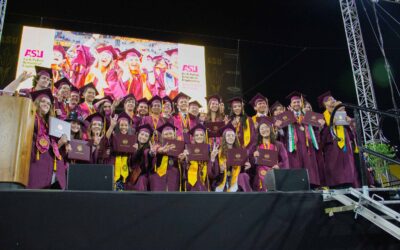New leaders making lasting impacts on society
By Fulton Schools
January 19, 2023
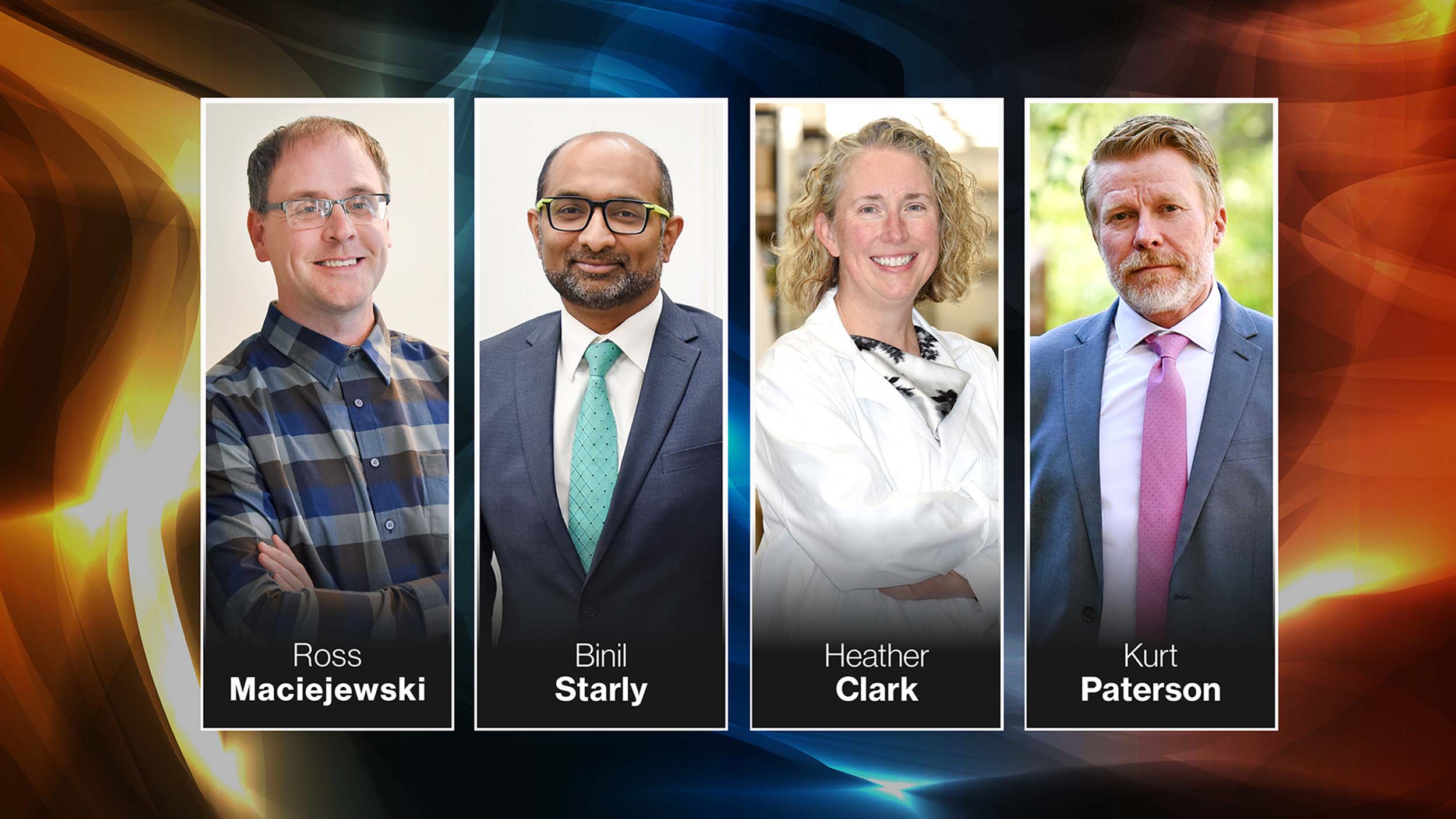
Arizona State University is ushering in a new era of engineering education with the nation’s largest and most comprehensive engineering school. The Ira A. Fulton Schools of Engineering is proud to welcome four new leaders who will play an integral role in shaping our programmatic direction and enhancing our reputation for academic and research excellence: Heather Clark, director of the School of Biological and Health System Engineering; Ross Maciejewski, director of the School of Computing and Augmented Intelligence; Kurt Paterson, director of The Polytechnic School; and Binil Starly, the inaugural director of the School of Manufacturing Systems and Networks.
These leaders bring with them the knowledge, insights and energy that will elevate our culture of excellence and innovation in the Fulton Schools of Engineering.
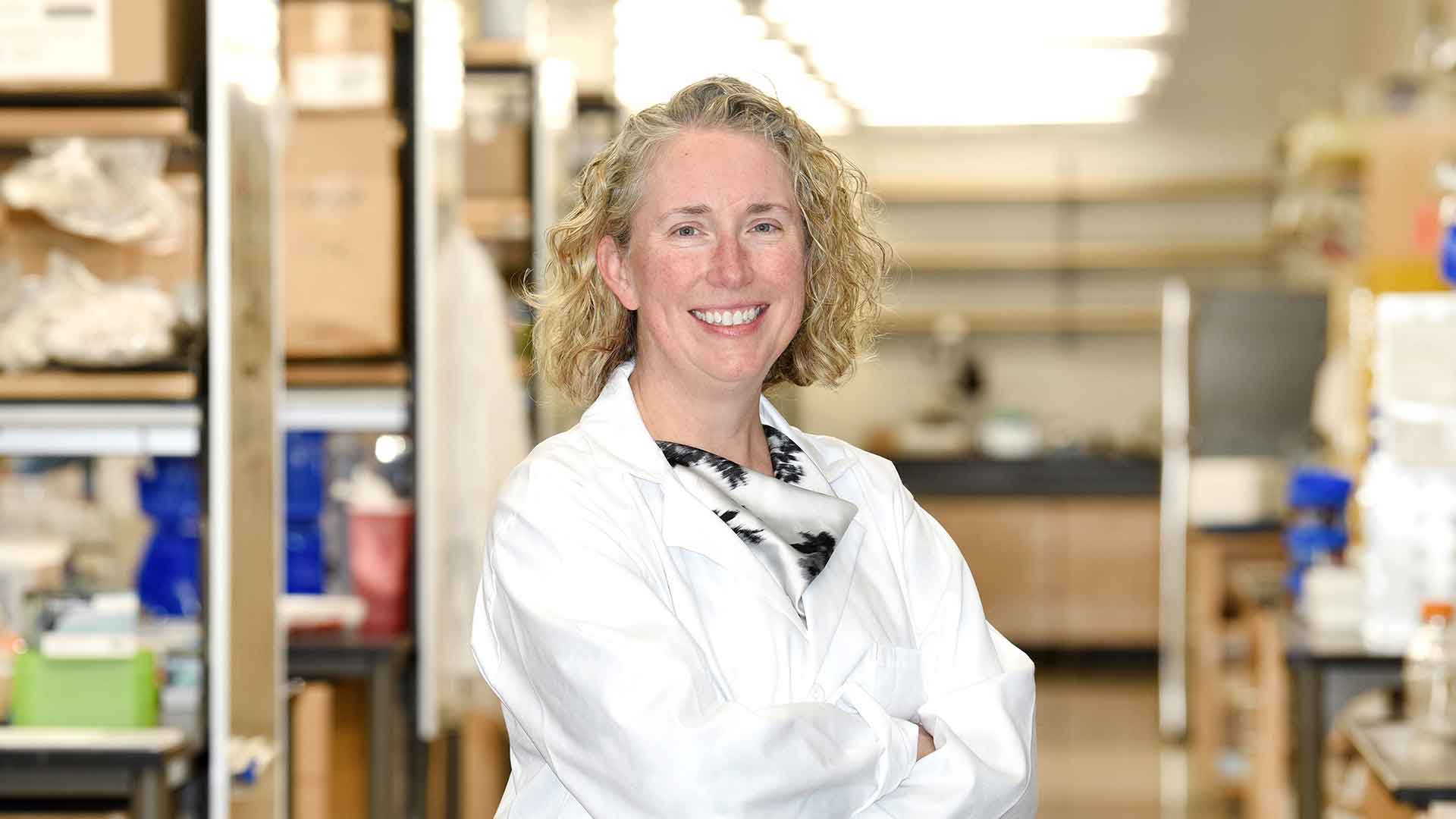
Heather Clark
Director, School of Biological and Health Systems Engineering
PhD, University of Michigan, 1999
Heather Clark was drawn to the School of Biological and Health Systems Engineering, one of the seven schools in the Fulton Schools of Engineering at Arizona State University, due to the enthusiasm and commitment of the faculty to their research and teaching.
Clark took the helm of the school this fall to guide this energy as its new director. Her vision for the school is to work together with the faculty to make real impacts. While this is often biomedical engineers’ purpose for entering the field, Clark realizes the day-to-day tasks of an academic often get in the way.
“I hope to empower the faculty to take risks in their research, entrepreneurship and teaching that result in impact in those areas,” Clark says, “for example, translating prominent research to the clinic or starting a company while engaging our innovative students in the process as a real-world teaching opportunity.”
These goals, as well as the passion of her fellow faculty members, align well with the ASU Charter. Clark says she had never seen such a focus on the charter at other universities and looks forward to also supporting the charter in her new role.
Clark brings a wealth of experience from her work as a professor of bioengineering at Northeastern University, where she has worked in various positions over the past 12 years.
She was also the founding director of the Institute for Chemical Imaging of Living Systems, or CILS, which develops imaging tools that highlight chemical processes clinicians can use for disease diagnostics and treatment. In that role, she envisioned the scientific idea of the institute and built the infrastructure, including its staff and Imaging Core facility.
“I brought together faculty and students around a research team and built the infrastructure to enable discovery and impact,” she says. “I would like to bring these themes — teamwork, centralized research resources and partnerships with industry — to the [School of Biological and Health System Engineering].”
In her research, Clark is particularly fascinated by nanosensors and their ability to measure aspects of the human body that can’t be accessed with traditional methods.
“Many of the processes of the body, from neural signaling to the immune system, are specific biochemical signatures that can’t be readily visualized,” she says. “Tools produced by my group can measure processes that can’t be imaged any other way.”
Her nanosensor research is particularly focused on its use in the brain and nervous system, and she has multiple ongoing research projects funded by the National Institutes of Health Brain Research Through Advancing Innovative Neurotechnologies, or NIH BRAIN Initiative, and the National Institute of Biomedical Imaging and Bioengineering, one of the National Institutes of Health.
Clark’s work has earned numerous honors, including a Defense Advanced Research Projects Agency, or DARPA, Young Faculty Award for research into nanosensors that monitor neurotransmitter release in the brain, and she is a fellow of the American Institute for Medical and Biological Engineering, also known as AIMBE. Clark also has numerous U.S. patents for work related to her research.
She has published more than 50 peer-reviewed research articles and has been invited to speak at many conferences and seminars. Clark is often quoted by the media — including The Atlantic, CNN and WIRED — as an expert in nanotechnology, wearable and implanted technology and other topics related to her research.
In education, Clark is interested in preparing the next generation of biomedical engineering professionals with the interdisciplinary skills they need to succeed. She designed and directed a two-year professional science master’s degree program in biomedical nanotechnology at Northeastern University that focuses on nanotechnology, law and business.
She also earned an award for teaching excellence at Northeastern University for her efforts.
This fall, she learned about ASU alongside her first-year students by teaching an ASU 101 introductory course for biomedical engineering majors.
After the isolation of the COVID-19 pandemic, Clark hopes to remedy the negative and lasting impact it had on educational and research goals.
“I am excited to find ways to bring faculty, students and staff together to reconnect through a shared vision for research and education,” Clark says.
Outside of engineering, Clark enjoys running — she signed up for a half marathon this winter — and spending time with her two miniature dachshunds, Hilo and Kona.
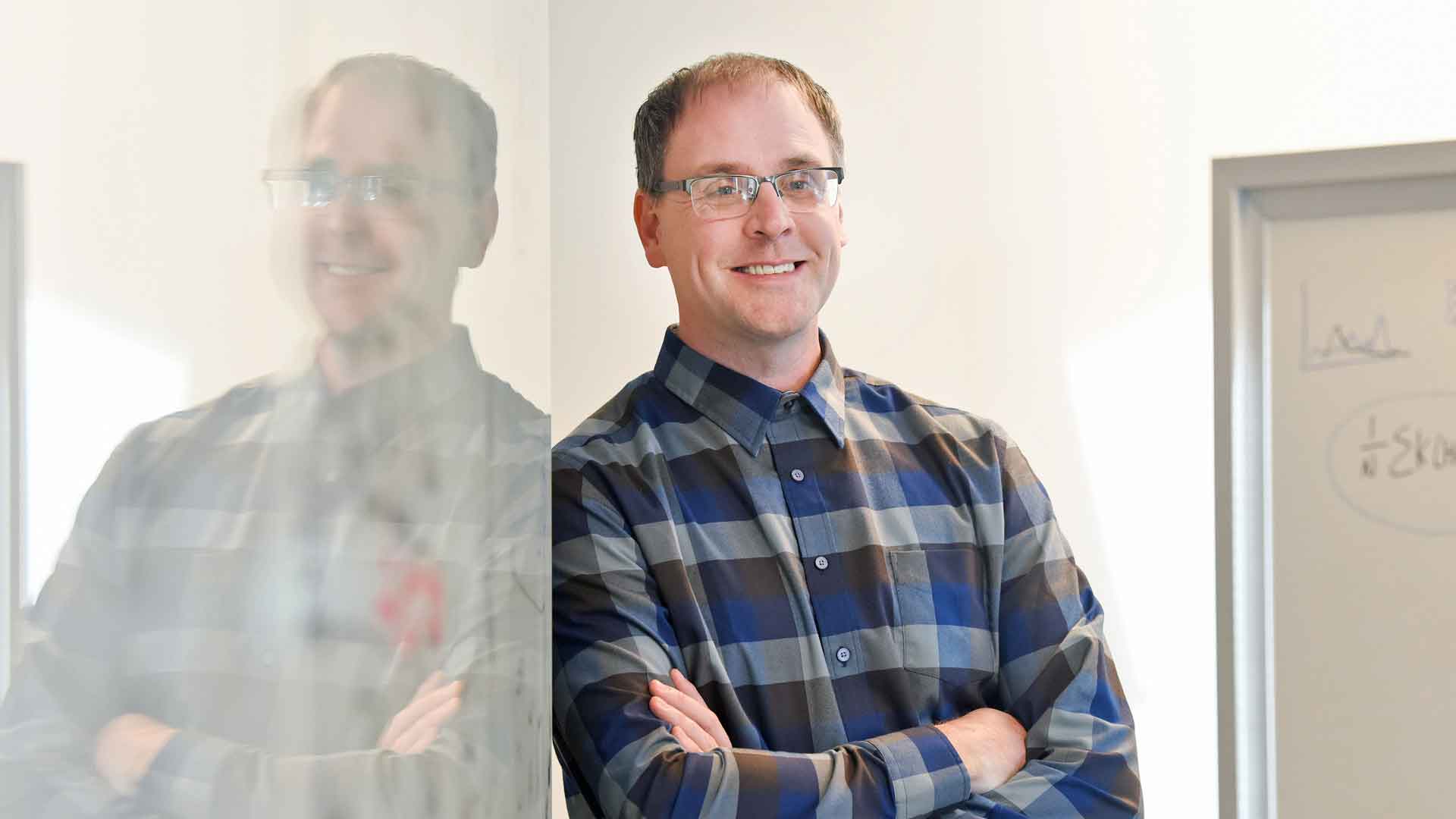
Ross Maciejewski
Director, School of Computing and Augmented Intelligence
PhD, Purdue University, 2009
A driving force behind Ross Maciejewski’s research is being able to use visualization to address real-world problems.
In 2011, Maciejewski joined the Fulton Schools of Engineering, where Arizona State University’s vision for the New American University helped him further develop his research objectives in visual analytics to address solutions for law enforcement, health care and anomaly detection.
“I saw that the problems I’m interested in paralleled this model at ASU, investigating use-inspired research and vetting solutions that can help the community,” Maciejewski says. “It can be really fulfilling to see how this research can be deployed in the field, especially when the problems we’re researching can have a tangible impact.”
In the School of Computing and Augmented Intelligence, part of the Fulton Schools at ASU, Maciejewski has spent the last six years as director of the Center for Accelerating Operational Efficiency, or CAOE, a Department of Homeland Security Center of Excellence.
Envisioned as a joint center at the intersection of industrial engineering and computer science, CAOE develops and applies advanced analytical tools and technologies to enhance planning, information sharing and real-time decision making in homeland security operations.
“The nice thing about visualization is that there are always people who need help analyzing their data,” Maciejewski says. “There are always new and interesting domain problems and sciences to work on, so we are able to gain knowledge about a variety of different fields.”
Maciejewski has received several notable awards for his research, including the ACM CHI Honorable Mention Award in 2022 for his research titled, “Annotating Line Charts in the Wild,” the IEEE Transactions on Visualization and Computer Graphics Best Associate Editor Award in 2021, and the ACM CHI Honorable Mention Award in 2018 for research titled, “TopoText: Context-Preserving Text Data Exploration Across Multiple Spatial Scales.”
Earlier, he won the 2017 EuroVis Best Paper Award for research titled, “Nested Tracking Graphs,” the VAST Grand Challenge Award: Outstanding Comprehensive Submission awarded at the IEEE Conference on Visual Analytics Science and Technology in 2015 for the “VADER/VIS-Grand Challenge,” and the Meritorious Team Commendation from the U.S. Coast Guard in 2013 for his work at Purdue’s VACCINE Center as part of the Port Resilience for Operational Tactical Enforcement to Combat Terrorism, or PROTECT, team.
Most notably, he received the prestigious National Science Foundation Faculty Career Development, or CAREER, Award in 2014 for his research in visual analytics, which awarded $450,000 for his research and outreach efforts.
In the Fulton Schools, Maciejewski has been honored by Dean Kyle Squires with the title of Ira A. Fulton Professor of Computer Science and was named an ASU Fulton Faculty Exemplar and Global Security Fellow.
Now, Maciejewsi is taking on a new role as director of the School of Computing and Augmented Intelligence. In CAOE, he will continue as co-director alongside industrial engineering Assistant Professor Adolfo Escobedo, who Maciejewski says will bring a fresh perspective and elevate the center’s mission with his strong background in mathematics.
“I’m excited for the opportunity to be able to drive an agenda at the intersection of all the different degree programs we have within SCAI, and be able to leverage those within Phoenix and Arizona,” he says. “SCAI is a wonderful school with incredible potential, and my goal is to continue growing these programs and offering students high quality education while serving the New American University mission for access and inclusivity.”
His vision for the future of the School of Computing and Augmented Intelligence also includes goals to establish the school as a premier research institution, continue to raise the school’s national rankings, attract research funding, elevate degree programs and collaborate with staff and faculty to achieve common goals.
“SCAI offers an interesting intersection between computer science and industrial engineering, which are programs that have a lot of synergy and that I see having a potential for growth that would allow really exciting opportunities,” Maciejewski says. “As director, I’m looking forward to leveraging this potential and exploring how we can incorporate computational technology advances into our degree offerings.”
Outside of his work at ASU, Maciejewski’s world is centered around family. Much of his free time is spent exploring attractions in Phoenix with his wife and two-year-old son.
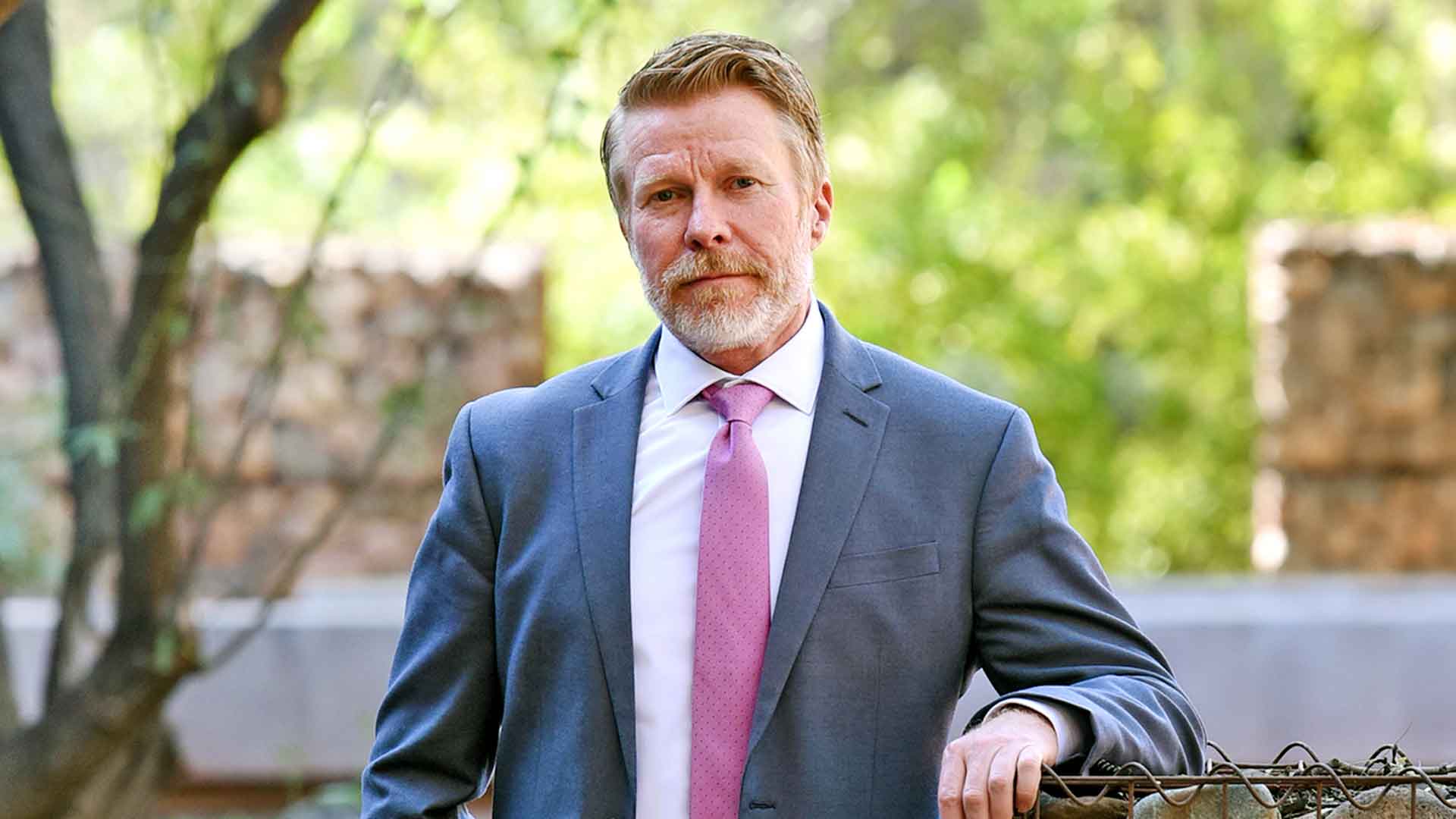
Kurt Paterson
Director, The Polytechnic School
PhD, University of Iowa, 1993
As a first-generation college student, it took Kurt Paterson some time to find his passion in engineering, but a serendipitous conversation would change that.
Paterson recalls that during his senior year in college, he ran into a fellow student who had been a year ahead of him in the same mechanical engineering program.
“I was surprised to see him on campus because he had graduated a few months earlier, but he explained to me that he was now a graduate student in environmental engineering,” Paterson says.
He queried the student about both graduate studies and environmental engineering and was directed to visit the head of the degree program.
“That would lead me to environmental engineering for graduate school and fundamentally change my motivation and interest in continuing my career in engineering,” Paterson says.
What has kept him interested in that pursuit, “is the privilege of making meaningful contributions to finding solutions to problems that matter, and unfortunately our environment is full of those kinds of problems,” he says.
As the new director of The Polytechnic School, part of the Fulton Schools of Engineering at Arizona State University, Paterson is in a position that presents him with an expansive array of challenges in his field.
Paterson is coming into the job equipped with the expertise he has gained in engineering education, higher education leadership and engineering diplomacy, and with a commitment to make an impact.
“I’m excited to explore how a modern polytechnic school can redefine the ways that universities can serve the world,” Paterson says, “and the possibilities for creating inclusive pathways for substantial numbers of students, faculty and staff to be force multipliers for positive change in the world.”
He will seek to fulfill those aspirations by applying knowledge and skills acquired in previous roles as a professor of engineering at James Madison University and as a Jefferson Science Fellow at the National Academies of Sciences, Engineering, and Medicine, as well as his current position as a Senior Sustainability Advisor for the U.S. Department of State.
Paterson’s leadership duties as a new school director won’t keep him out of the classroom. As a climate mitigation and air pollution expert, he plans to offer a climate engineering course that will explore the technology and decision-making necessary to abate climate change while at the same time benefitting society.
His students should prepare to explore opportunities in data analysis and modeling, integrating the technical, social and financial aspects of their projects, and working with diverse project teams.
In his free time, Paterson says he engages in his hobbies as “a struggling mandolin player and a pretty good photographer” who loves to travel and is “fascinated by simplicity.”
That affinity for simplification derives from his view of it as “a sign of expertise and high-level empathy coming together” in science, engineering and technology.
“I like to see attention given to people in the development of innovations, both in the care for the user of new tools, technologies and products, and the setting aside of the designer’s ego,” Paterson says, giving as examples of this simplifying approach the pencil, the Shazam app, the Plint Coffee Table, and the Vanmoof bicycle.
As an engineer, Paterson says he ponders, “how might we benefit from translating simplicity into higher education?”
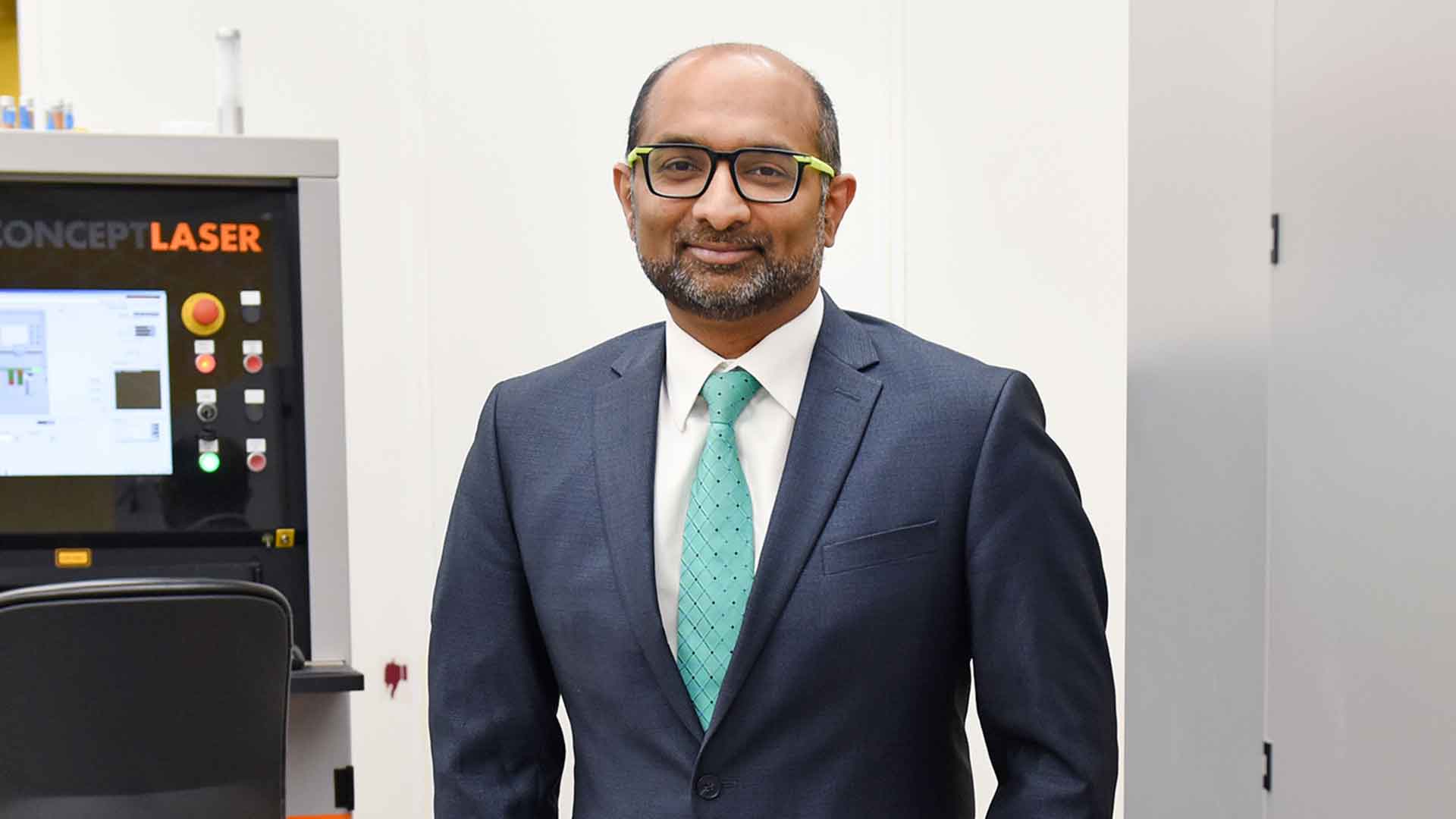
Binil Starly
Director, School of Manufacturing Systems and Networks
PhD, Drexel University, 2006
Growing up, Binil Starly was fascinated by computers. He eventually began developing intelligent machines that combined hardware and software innovations for the future of manufacturing.
Today, Starly has taken on the role that his younger self has always been preparing for — directing and teaching at Arizona State University’s School of Manufacturing Systems and Networks, the newest of the seven engineering schools in the Fulton Schools of Engineering.
Starly believes his experiences, accomplishments and accolades in digital manufacturing have equipped him for this vital role.
“I chose to come to Arizona for the importance that the university and state of Arizona have placed on manufacturing,” Starly says. “ASU has developed an environment that encourages fundamental and translational research to impact society, while recognizing that partnerships and collaborations are key to pursuing solutions to large problems.”
Starly, who was named one of the 20 most influential professors in smart manufacturing by the Society of Manufacturing Engineers in 2020, looks forward to building core competencies in advanced manufacturing processes, cyber manufacturing and operations engineering, digital factories, and robotics and automation at ASU — elements that he says are necessary for advancing manufacturing in the nation.
Teaching these subjects in the classroom will set the groundwork for propelling the new school forward. This drive to push the School of Manufacturing Systems and Networks into the future is why Starly teaches digital manufacturing and Python programming for engineers.
“In all of my classes, I focus on the development of core technical skills, opportunities for self-learning and project-based activities that incorporate concepts learned in class and extended learning personalized to the career aspirations of the student,” says Starly, who received a National Science Foundation Faculty Early Career Development Program (CAREER) Award for his contributions to smart manufacturing.
As activity in the School of Manufacturing Systems and Networks ramps up — including launching a new doctorate program in manufacturing engineering — Starly is highly engaged in its development and is excited about what the future holds for the unique school.
In his spare time, Starly likes to put his foodie hat on, trying out new cuisines and recipes with his family.
“I think I have perfected the tiramisu,” Starly says.
Fulton
Researchers
Heather Clark
Director and Professor
School of Biological and Health Systems Engineering
Ross Maciejewski
Director and Professor
School of Computing and Augmented Intelligence
Kurt Paterson
Director and Professor
The Polytechnic School
Binil Starly
School Director and Professor
School of Manufacturing Systems and Networks
Related Stories
ASU researchers use diamonds for electrical power
Professor Trevor Thornton leads research through ASU’s AMPED Science and Technology Center to create diamond and boron nitride transistors
Fulton Schools Wrapped: 2022 year in review
Revisit some of the year’s most impactful achievements published on our engineering news blog, Full Circle, and ASU News
Domestic manufacturing efforts strengthened by new ASU school
The School of Manufacturing Systems and Networks hosted an open house to mark its launch, featuring discussions led by top manufacturing leaders
ASU’s Ira A. Fulton Schools of Engineering hits record enrollment
The Ira A. Fulton Schools of Engineering has reached an impressive milestone — student enrollment hit a high of 30,000 students this fall. Rankings, accreditations and student programs contribute to success.

